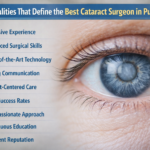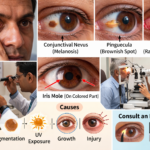Cataracts are one of the most common causes of vision impairment, especially among the elderly. They occur when the natural lens of the eye becomes cloudy, causing blurred or hazy vision. At Axis Eye Clinic, led by the renowned ophthalmologist Dr. Ramesh Murthy, patients receive world-class cataract diagnosis and treatment using the most advanced techniques and technologies. Recognized as the Best Eye Clinic in Pune, the hospital focuses on restoring clear vision and improving quality of life through precise surgical expertise and compassionate care.
Types of Cataracts:
Nuclear Cataract: Forms in the center of the lens and gradually hardens, leading to yellow or brown vision.
Cortical Cataract: Develops on the edges of the lens and appears as white, wedge-like opacities that progress toward the center.
Posterior Subcapsular Cataract: Occurs at the back of the lens, causing glare and difficulty reading.
Congenital Cataract: Present at birth due to genetic factors or infections during pregnancy.
Blurred or cloudy vision
Difficulty seeing at night
Sensitivity to light and glare
Fading or yellowing of colors
Double vision in one eye
Frequent changes in eyeglass prescription
If you are facing these symptoms, it’s important to visit an Eye Clinic near me for a professional eye examination and accurate diagnosis.
Aging: The most common cause due to natural lens changes over time.
Diabetes: High blood sugar levels can accelerate cataract formation.
Prolonged UV Exposure: Direct sunlight damages lens proteins.
Smoking and Alcohol: These habits can increase the risk of early cataracts.
Eye Injury or Surgery: Trauma can lead to secondary cataract formation.
Certain Medications: Long-term use of corticosteroids can increase risk.
1. Phacoemulsification (Phaco Surgery):
This is the most common and advanced form of cataract surgery. It involves using ultrasonic energy to break up the cloudy lens, which is then gently removed through a tiny incision. A foldable IOL is implanted, restoring clear vision.
2. Femtosecond Laser-Assisted Cataract Surgery (FLACS):
This blade-free, computer-guided laser surgery provides unparalleled precision and safety. It ensures perfect incision placement and accurate lens alignment, resulting in faster recovery and better visual outcomes.
3. Premium IOLs for Clearer Vision:
Dr. Ramesh Murthy offers a wide range of premium intraocular lenses, including multifocal, toric, and trifocal IOLs, to help patients achieve sharp vision without dependency on glasses.
Patients looking for a cataract surgeon near me can trust the experience and advanced surgical expertise available at Axis Eye Clinic.
Post-Operative Care Tips:
Use prescribed eye drops regularly to prevent infection.
Avoid rubbing or touching the operated eye.
Wear protective glasses when outdoors.
Avoid strenuous activities for a few days.
Attend all follow-up visits with your ophthalmologist.
What Are Cataracts?
A cataract is a clouding of the eye’s natural lens, which lies behind the iris and the pupil. This cloudiness prevents light from passing clearly through the lens to the retina, resulting in blurry, dim, or distorted vision. Cataracts usually develop gradually and can affect one or both eyes. While they are most commonly age-related, they can also result from trauma, certain medications, or systemic diseases like diabetes.Types of Cataracts:
Nuclear Cataract: Forms in the center of the lens and gradually hardens, leading to yellow or brown vision.
Cortical Cataract: Develops on the edges of the lens and appears as white, wedge-like opacities that progress toward the center.
Posterior Subcapsular Cataract: Occurs at the back of the lens, causing glare and difficulty reading.
Congenital Cataract: Present at birth due to genetic factors or infections during pregnancy.
Common Symptoms of Cataracts
Cataracts may develop slowly, often without noticeable symptoms in the early stages. As they progress, you may experience:Blurred or cloudy vision
Difficulty seeing at night
Sensitivity to light and glare
Fading or yellowing of colors
Double vision in one eye
Frequent changes in eyeglass prescription
If you are facing these symptoms, it’s important to visit an Eye Clinic near me for a professional eye examination and accurate diagnosis.
Causes and Risk Factors of Cataracts
Several factors contribute to the development of cataracts, including:Aging: The most common cause due to natural lens changes over time.
Diabetes: High blood sugar levels can accelerate cataract formation.
Prolonged UV Exposure: Direct sunlight damages lens proteins.
Smoking and Alcohol: These habits can increase the risk of early cataracts.
Eye Injury or Surgery: Trauma can lead to secondary cataract formation.
Certain Medications: Long-term use of corticosteroids can increase risk.
Diagnosis of Cataracts
An eye examination by a specialist is the first step in diagnosing cataracts. At Axis Eye Clinic, advanced diagnostic tools like slit-lamp examinations, visual acuity tests, and retinal imaging are used to determine the type and severity of cataract. Dr. Ramesh Murthy, an experienced Best Cataract Surgeon in Pune, ensures accurate evaluation and recommends the best possible treatment approach tailored to each patient’s needs.Treatment Options for Cataracts
Cataracts cannot be treated with medication or lifestyle changes. The only effective treatment is cataract surgery, where the cloudy natural lens is removed and replaced with a clear artificial intraocular lens (IOL).1. Phacoemulsification (Phaco Surgery):
This is the most common and advanced form of cataract surgery. It involves using ultrasonic energy to break up the cloudy lens, which is then gently removed through a tiny incision. A foldable IOL is implanted, restoring clear vision.
2. Femtosecond Laser-Assisted Cataract Surgery (FLACS):
This blade-free, computer-guided laser surgery provides unparalleled precision and safety. It ensures perfect incision placement and accurate lens alignment, resulting in faster recovery and better visual outcomes.
3. Premium IOLs for Clearer Vision:
Dr. Ramesh Murthy offers a wide range of premium intraocular lenses, including multifocal, toric, and trifocal IOLs, to help patients achieve sharp vision without dependency on glasses.
Patients looking for a cataract surgeon near me can trust the experience and advanced surgical expertise available at Axis Eye Clinic.
Post-Surgery Recovery and Care
Cataract surgery is a short, painless procedure, and recovery usually begins within a few hours. Most patients notice improved vision within a day or two. However, following post-surgery care instructions is crucial for optimal results.Post-Operative Care Tips:
Use prescribed eye drops regularly to prevent infection.
Avoid rubbing or touching the operated eye.
Wear protective glasses when outdoors.
Avoid strenuous activities for a few days.
Attend all follow-up visits with your ophthalmologist.






